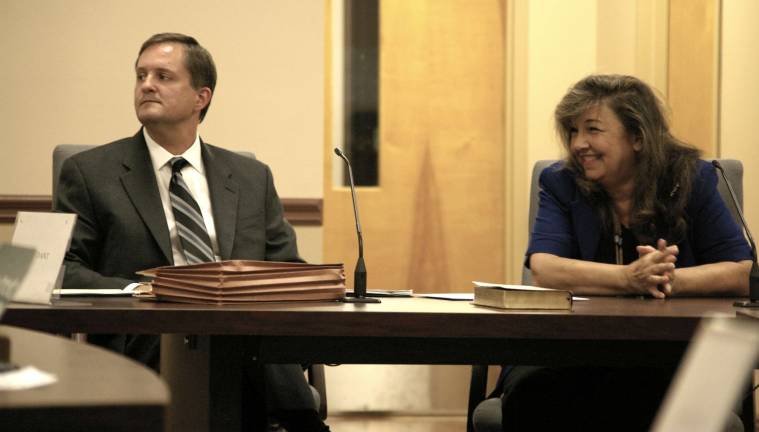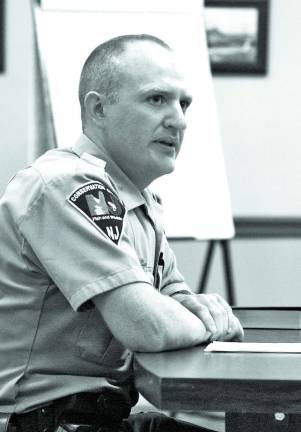BY CHRIS WYMAN
VERNON — Vernon resident and bear activist Susan Kehoe was recently acquitted of charges stemming from a 2011 incident in which the New Jersey Department of Environmental Protection alleged she illegally fed black bears on her property.
In March of 2008, DEP officers who were stationed in adjoining Wawayanda State Park videotaped Kehoe as she provided bags of sunflower seeds to bears in the backyard of her Vernon Township home. The surveillance operation was ordered after several neighbors complained she was feeding bears.
Kehoe was found guilty of the charge of intentionally feeding black bears and was given a written warning for the first offence, as required by state law. A second offence carries a fine of up to $1000.
2011 incident
On Dec. 8, 2011, the fourth day of black bear hunting season, Kehoe called authorities to complain that three hunters were walking through the woods on her property.
According to testimony, when conservation officers Kyle Ziegler and Frank Panito arrived they found no sign of trespassing hunters. However, the officers noticed a cloth on which there was pet kibble and sunflower seeds in addition to an open jar of peanut butter.
They also noticed no fewer than 50 mounds of animal scat. According to Ziegler, walking through the mounds of excrement was like “walking through a mine field.” The officers also noted that despite the kibble and sunflower seeds, there were no pets or birdfeeders nearby to explain the presence of such food sources. While at the scene, the officers took 11 photos, which were used as evidence along with samples of the kibble and seeds.
When they asked Kehoe about the kibble, she allegedly responded that she was watching someone’s Great Dane. The officers noted that there was no dog to be found nor was there any dog excrement in the area to suggest that a large dog had actually been there.
They also noted what they identified as large bear prints on Kehoe’s front door, which she explained were actually that of the dog. In testimony, Panito noted that if the prints were left on the door by a dog, it “would be the world’s largest Great Dane, ever.” The officers also noted that although there was a considerable amount of acorns on the ground, the bear scat contained remnants of kibble and sunflower seeds, but nothing that resembled acorns, such as hulls and caps. As a result, Kehoe was again issued a summons for intentionally feeding black bears.
During the trial Kehoe’s attorney, Daniel Perez, questioned both officers at great length to establish that the food in question could be used to attract any number of wild animals other than bears. He also established that no one personally saw Kehoe place the attractants on the ground. In addition, Perez noted that if it was Kehoe’s intent to feed animals, such as raccoons or squirrels, which is legal, and bears somehow discovered the food, Kehoe would not have been intentionally feeding the bears.
Following closing arguments by both Perez and prosecutor Michael Hanifan, Judge James Devine temporarily recessed the proceedings so that he could review his notes and the evidence in order to determine a verdict.
Weighing the evidence
When the judge returned about 20 minutes later he made a series of statements and observations as a prelude to announcing his decision. He noted that feeding and hunting bears is a “highly charged issue.” He also noted that the bear-feeding statute has only resulted in about four cases statewide since it was enacted in 2002.
Earlier in the proceedings, Perez had suggested that Kehoe was being selectively prosecuted because of her activist leanings. However, the judge said that since Kehoe had summoned the officers to her home, this was clearly not the case.
Devine also said that although the food was on the defendant’s property, no witness saw her place the food there nor was there any proof that Kehoe was intentionally feeding bears in particular.
“I cannot find that she intended to feed them, it is very difficult to read what is in someone’s mind," said Devine, before issuing the not guilty verdict.
After the conclusion of the trial, both the defense attorney and the prosecutor faulted the bear feeding statute as being poorly written and difficult, if not impossible, to enforce.


